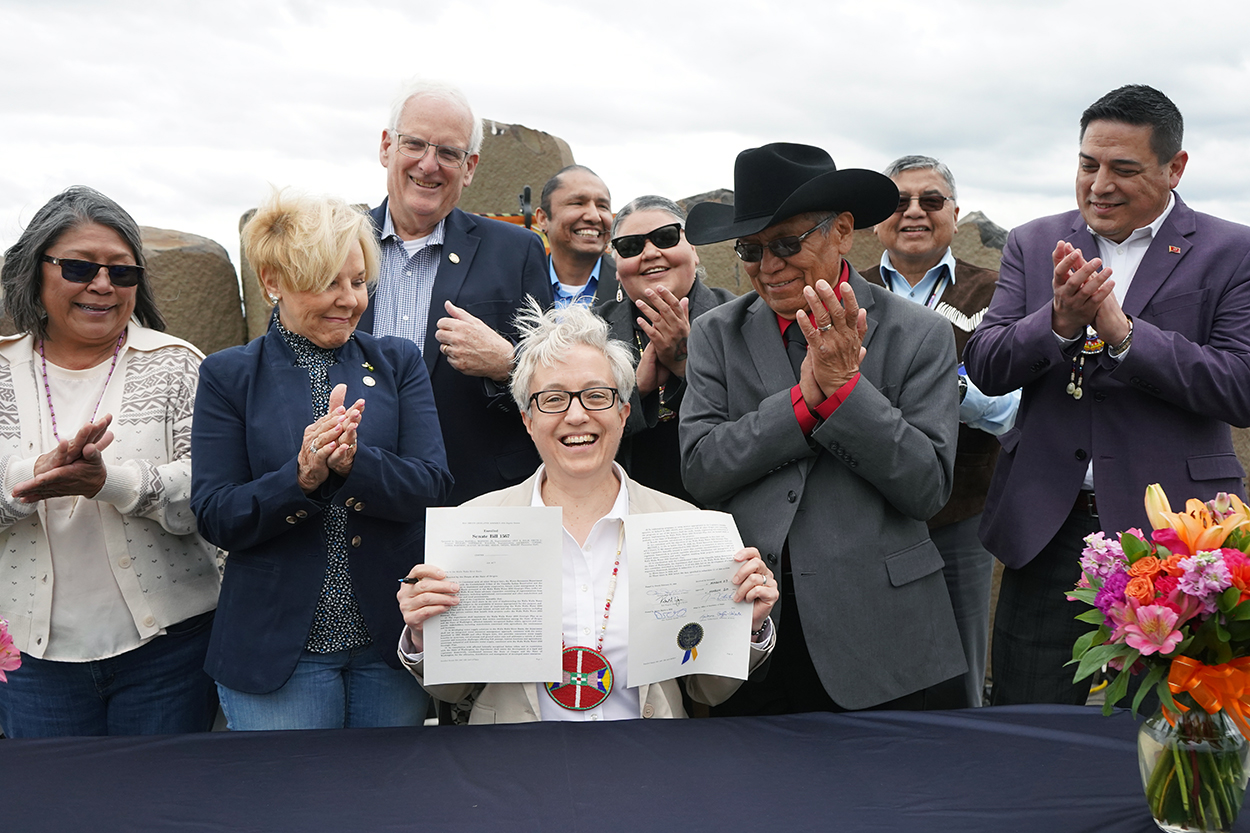
- Details
- By Native News Online Staff
The Confederated Tribes of the Umatilla Indian Reservation (CTUIR) on Thursday, April 25, welcomed Oregon Governor Tina Kotek for a visit that included a ceremonial signing of a bill calling for Oregon and Washington states to collaboratively resolve water issues facing the Walla Walla River.
Kotek began the day at the Nixyáawii Governance Center for an invocation and welcome reception from the Board of Trustees (Board) and CTUIR staff.
“We are honored by Gov. Tina Kotek’s visit to the Umatilla Indian Reservation,” CTUIR Chairman Gary I. Burke said. “Gov. Kotek has shown us that she is fulfilling her promise to learn in-depth about each of the nine federally recognized tribes in Oregon such that she and her administration can more effectively work with us as distinct, individual sovereign governments. We thank Gov. Kotek and her staff for taking the time to learn more about the Confederated Tribes, our tribal sovereignty, our treaty rights and the work we are doing here in Eastern Oregon and throughout our traditional use areas.”
Kotek’s visit was part of her commitment to meet with Oregon’s nine federally recognized sovereign tribal nations in 2024.
“Today’s visit with CTUIR was about strengthening our knowledge of the tribe’s unique history,” she said. “The tribe is working on some exciting, innovative initiatives and the state of Oregon is ready to support the good work of CTUIR however we can. I’d like to thank Chairman Burke, the Board of Trustees and all members of CTUIR for the hospitality they’ve shown us as we’ve listened and learned in their community.”
The welcome was followed by a private meeting with the Board to discuss CTUIR priorities and issues such as housing, energy, broadband expansion, health, water rights, treaty rights and regenerative agriculture, as well as fostering cooperation between the CTUIR and state.
Following the Yellowhawk tour, the governor and First Lady traveled to Thorn Hollow Bridge, which collapsed and was rendered inoperable during record-breaking floods on the Umatilla Indian Reservation in 2020. The bridge served as a connection between communities, residents and emergency services.
With funding to fix the county bridge available, Kotek told CTUIR officials that her office would inquire about the bridge project’s status. “So we should probably check to see where it sits in the queue for sure,” she said. “We will definitely look into it.”
More Stories Like This
Native News Weekly (August 25, 2024): D.C. BriefsNavajo Nation Mourns the Passing of Former Vice President Rex Lee Jim
Deb Haaland Earns Endorsement From Communications Workers of America Local 7076
University Soccer Standout Leads by Example
Two Native Americans Named to Democratic Congressional Campaign Committee's“Red to Blue” Program
Help us defend tribal sovereignty.
At Native News Online, our mission is rooted in telling the stories that strengthen sovereignty and uplift Indigenous voices — not just at year’s end, but every single day.
Because of your generosity last year, we were able to keep our reporters on the ground in tribal communities, at national gatherings and in the halls of Congress — covering the issues that matter most to Indian Country: sovereignty, culture, education, health and economic opportunity.
That support sustained us through a tough year in 2025. Now, as we look to the year ahead, we need your help right now to ensure warrior journalism remains strong — reporting that defends tribal sovereignty, amplifies Native truth, and holds power accountable.
 The stakes couldn't be higher. Your support keeps Native voices heard, Native stories told and Native sovereignty defended.
The stakes couldn't be higher. Your support keeps Native voices heard, Native stories told and Native sovereignty defended.
Stand with Warrior Journalism today.
Levi Rickert (Potawatomi), Editor & Publisher


